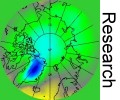 |
 |
Strong present-day aerosol cooling implies a hot future
The forecasts about the climate of tomorrow are not really optimistic. On June 30th 2005 the science magazine 'Nature' published an article which even amplifies the fear about a hot future on our planet. The authors say that today's dust in the air and its potential decrease in the future is not sufficiently included in the present climate models. The more particles cool the Earth at the moment, the hotter the future climate may become. [ more ]
|
 | | A simple model calculation
Why is the impact of aerosols so important for estimations of the future climate? The problem of the modellers can easily be understood if we use a simple example ... . [ more ]
|
 | |
Context: Global dimming
The influence of greenhouse gases is well understood. There are large uncertainties however concerning the impact of particles. We asssume that they cool down the lower atmospheric layer next to the Earth and therefore they counteract the greenhouse effect. This is because particles keep sunlight away from the Earth. Some scientists call this process "global dimming". [ more ]
|
 | | Links
Further information on particles, their origin and their diverse impact is described in the ESPERE climate encyclopaedia. Among the links you will find a selection of relevant articles. [ more ]
|
 | | Information for teachers
This special edition can be used in classes with the context 'greenhouse effect'. It is offered as a short release without the categories 'activities' and 'further information' for integration into classes.
Click here to access the: material corner
|







